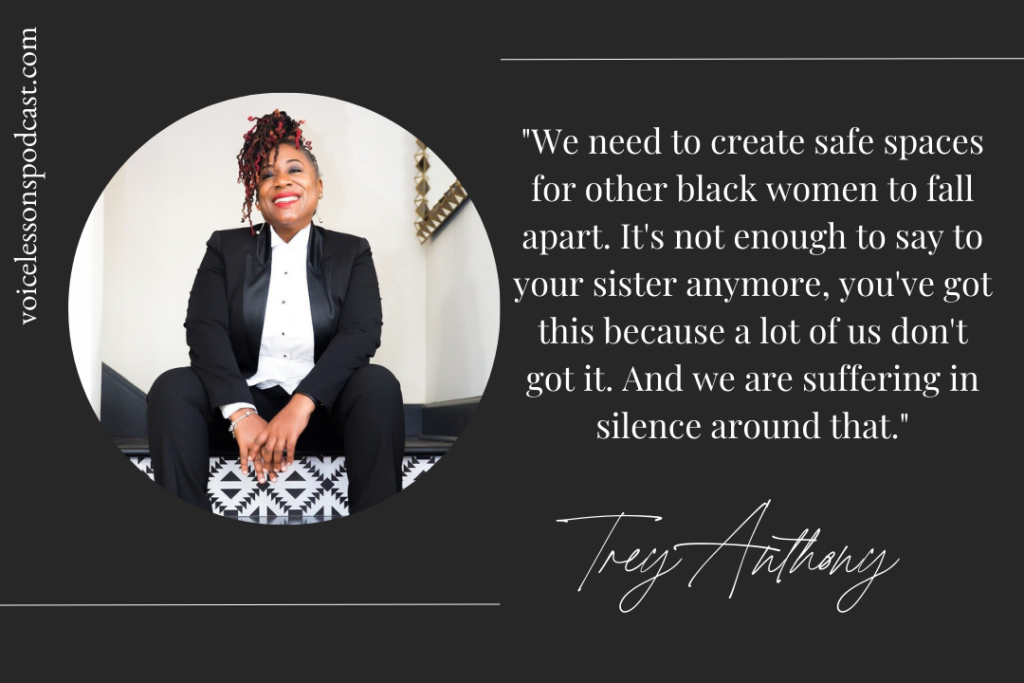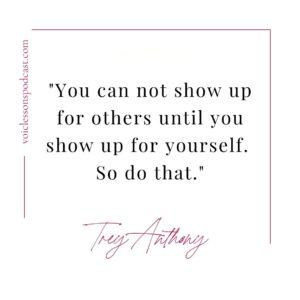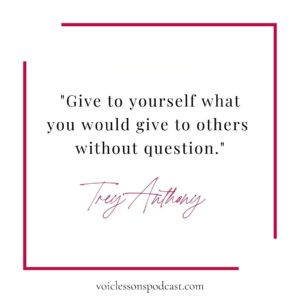A Lesson on Showing Up for Yourself with Trey Anthony
Why is it still so difficult for women who lead to ask for help, especially when it comes to their mental health? And, why are Black women even less likely to ask for it?
Why is it still so difficult for women who lead to ask for help, especially when it comes to their mental health? And, why are Black women even less likely to ask for it? In our special SEASON 2 launch on INTERNATIONAL WOMEN’S DAY, Kim speaks to award-winning producer, writer, and speaker Trey Anthony, best known for her work “Da Kink in My Hair” and most recently, her new book “Black Girl In Love (with Herself).” In this lesson on showing up for yourself, Trey speaks openly and honestly about coming to terms with her own depression, and how we as women can find freedom in expressing the truths about our daily struggles and fall back in love… with ourselves. (This episode includes colorful language).
 Trey Anthony is a British-born Canadian playwright, actor, and producer, best known for her award-winning play and television series Da Kink in My Hair. As a producer, she worked for the Women’s Television Network and the Urban Women’s Comedy Festival.
Trey Anthony is a British-born Canadian playwright, actor, and producer, best known for her award-winning play and television series Da Kink in My Hair. As a producer, she worked for the Women’s Television Network and the Urban Women’s Comedy Festival.LISTEN: APPLE PODCASTS | STITCHER | SPOTIFY
TOPICS DISCUSSED IN THIS EPISODE:
• How Trey’s grandmother influenced her creativity, career, and eventually her voice.
• Why Trey started her first piece “Da Kink in My Hair” and what the show represents in regards to issues Black women face in their daily lives.
• How “Da Kink in My Hair” became an overnight sensation.
• Trey is the first Black woman in Canada to ever have a television show on a major prime-time Canadian network.
• Black Culture in Canada vs. the United States.
• How Trey made space for Black women in the self-help market.
• Black Girl in Love (with Herself) addresses the real things that occur to Black women as they move through spaces.
• There’s a stigma in the Black community around depression and mental health issues that we do not talk about, and yet it’s happening.
• How do we create a safe space for Black women to fall apart if they need to?
• If you look at so many of the movements of social change that are happening, Black women are at the forefront.
• When you are not recognized, you have nothing to lose.
• Many women leaders are viewed as the strong ones and have a hard time admitting when they are struggling, and how Trey navigated this personally.
• By the time Black women actually seek health for mental health issues, their symptoms are 5X more severe than white women.
• As women, we think we can handle more than we actually can and it’s ok to ask for help.
• There is a common misconception among women that receiving comes with strings attached.
• Asking for that support and being carried is part of the modeling of what the new success means.
• How mothering changed Trey and her journey as a solo parent.
• The rules that are written in the culture for the way we do things don’t actually make sense for busy women.
• Feminine leadership looks like in today’s society looks like so many different things, because we are doing it all.
RESOURCES/ADDITIONAL INFORMATION:
‘Da Kink in My Hair’ by Trey Anthony
How Black Mothers Say I Love You, Trey Anthony
Black Girl in Love (with Herself), Trey Anthony
#LESSONUP:
(3:30- 3:45) My first audition was to play crackhead number one, then there was crackhead number two. And then there was a black girl on welfare, number three. And it was just all of these really stereotypical roles. And I remember coming home one day, just crying. And I said to my grandma “they just keep giving me these awful roles.” And my grandmother said, well, if they’re writing shit for you, then write your own shit. And that’s how I started writing, out of real necessity.
(8:22-8:49) My brother was in this training program for young producers in Canada and he said what they were talking about “Da Kink In My Hair” as the multicultural show of the time and nothing has been done ever since then as a black show in Canada. And we came off the air in 2010. I just think it’s shameful that this is the show that they still are talking about as their flagship show. How many years later around diversity in Canada.
(10:20- 11:10) I think it’s one of those things where you reinvent yourself every couple of years and as much as I really loved writing and as much as I really loved acting, I felt there was a bigger calling and purpose in my life. And for me, I was really interested in the self-help market. I’ve always been very interested in manifesting, visioning your thoughts and how they really influence what shows up in your life. And the more I kept doing this and the more people kept talking to me about it and the more I kept talking to people about it, I just realized for myself that there was again, another space that was not including black women.
(13:25- 14:40) So for me, the book was really about saying, “it’s time we really pull back the curtains and take a look at how certain things have really affected us every single day.” And yet we get up in this mode of, “Oh, I’m a strong black woman. I’m surviving, I’m doing this.” In the book, I talk about one of the biggest things and the messaging that I get. I said “I’ve been guilty of this, where I would leave really empowering messages on my friends Facebook or if I called them, I’d say, “you got this girl” or “yes!” And leave an Angela Davis quote or something really empowering. And when I was going through my own breakup and demise of my world was falling apart, I realized I didn’t have a safe space to fall apart. All of my friends were giving me these words of encouragement and I felt a level of shame around. I didn’t feel like I got it. I didn’t feel strong. What I felt was really weak, really vulnerable, really scared, really pathetic. And I just didn’t feel that there was any space for me to fall apart because everybody always saw me as the strong one, the one who’s got it, and I was in a real state of depression. And I thought I was the only one who was going through that.
(14:40-14:59) We need to create safe spaces for other black women to fall apart. It’s not enough to say to your sister anymore, you’ve got this because a lot of us don’t got it. And we are suffering in silence around that.
(18:30- 19:40) And for me, it was about saying to people I really am struggling here. And in the book I talk about the first time I sought out professional help and I was very much seeing a therapist, but what was so hilarious to me and the irony of it as I was writing this book, I was interviewing, a black psychotherapist. And she was talking about how with black women, when they suffer from depression, that a lot of us don’t even know that we’re in a depression. And so by the time we actually seek help, our symptoms are five times more severe than white women because we do not even recognize that we’re depressed. And she was listing them all. I was sitting there going, “Oh my God, I have these symptoms.” And yet I was getting up and doing this. And that was when I realized for myself, I was in a severely depressed mode and I actually went and saw help for the first time.
(20:30- 21:50) I know how it feels to be in this space. I know how it feels. And when we spoke, I said, I also have depression. I’ve also been in that dark space. And they said, you, you have it all together. You were at the top of your game. You and I said, yes, I have it all together. And yes, I’m at the top of my game, but I also have depression. And they said one does not cancel out the other. And I think until we recognize that in the black community. I had a friend who called me, who said “I attempted suicide twice. And no one knows. And since you’ve come out and talked about your own struggle with depression is good. It’s freed me.” I’ve had other women who are like, “Oh yeah, I’m popping these pills too. I haven’t told anybody, but I’ve been on medication for two years and I haven’t told anybody.” And so I think it’s just the stigma in the community that you do not talk about it. And so for me, I think if somebody who was in the public eye had spoken really about their own struggles, I would have been able to recognize my symptoms sooner and not been in such a dark and desperate space.
(22:36-23:25) I think we do not need to get to the state where I was, where it was feeling heavy. I do not think we need to get to this point. This is about you as a black woman asking for support because you give it to other people without question. So why can you not give it to yourself? And I think that is what I would say to any woman listening, give to yourself what you would give to others without question. And a lot of us do that, but we don’t think that we are worthy of that. And that was a lesson that I had to learn because I do it. I show up for everybody and I show up in a way and give a hundred percent at all times. And yet I don’t feel that I’m worthy of that level of support.
(25:02- 25:40) Your thoughts become things. If you’re walking around with that, that is what is going to show up in your life. And I have to change that narrative. And so I started to change that narrative around saying, it is okay.
(26:40- 27:09) I had my son in my arms and I was looking down at him and I said, he deserves a mother who was well, he deserves a mother who is balanced. He deserves a mother who has somebody to talk to. And I called up my friend and I said, “Hey, here’s my bank account number. I need that money. Thank you.”
PIN IT:


A Lesson On Showing Up for Yourself with Trey Anthony
VIEW THE COMMENTS